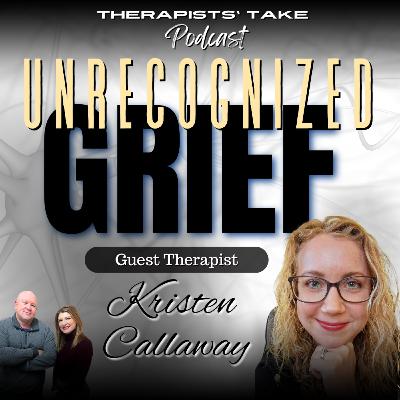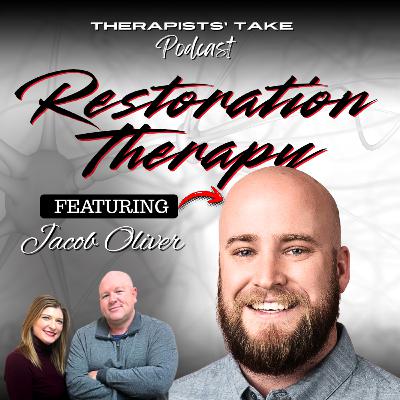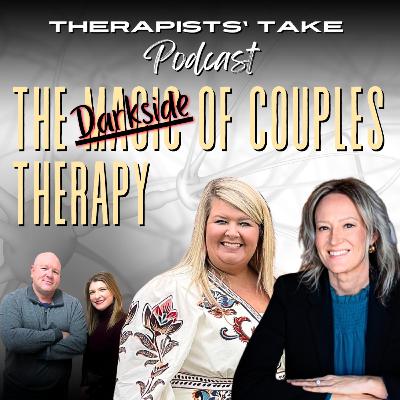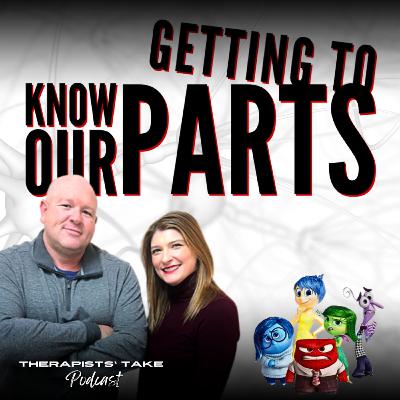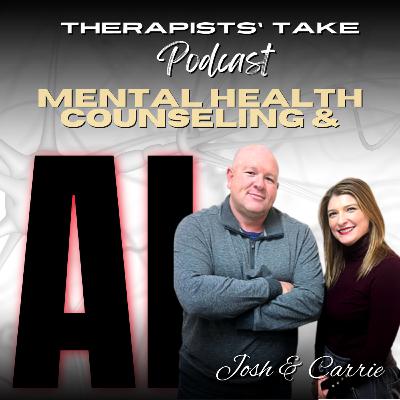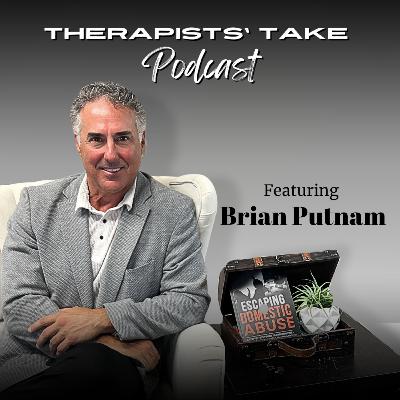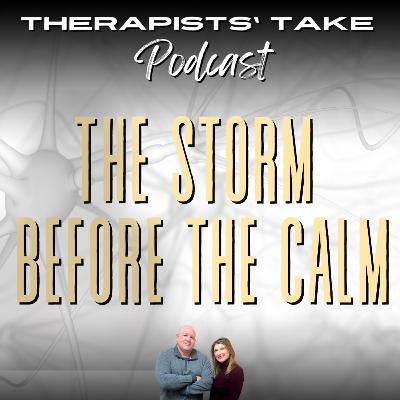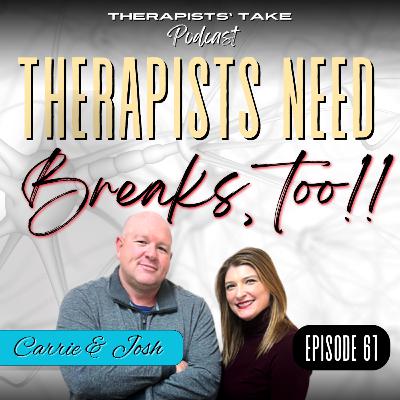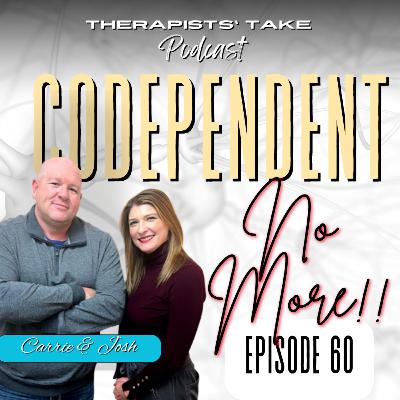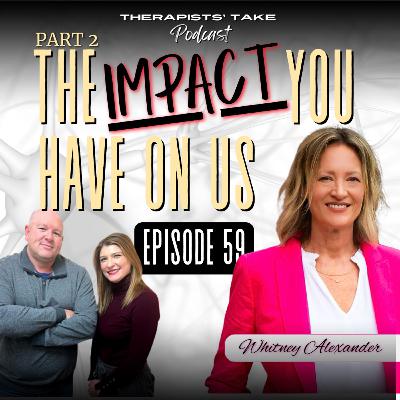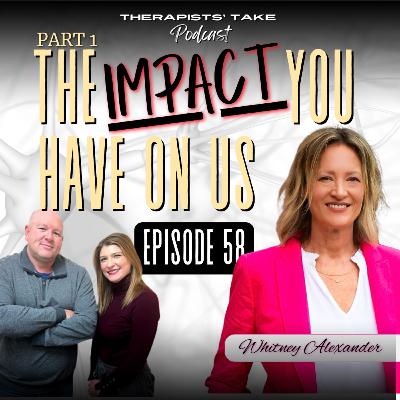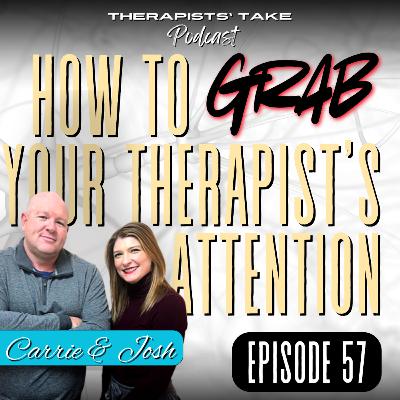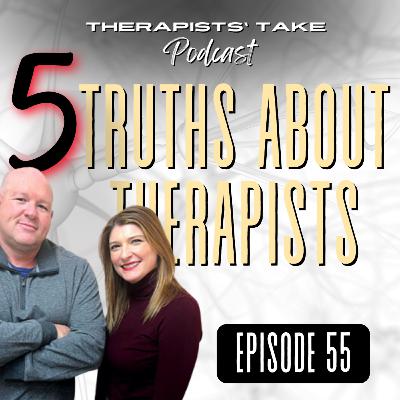Discover Therapists' Take with Carrie and Josh
Therapists' Take with Carrie and Josh

Therapists' Take with Carrie and Josh
Author: Family Solutions Media
Subscribed: 4Played: 120Subscribe
Share
© Family Solutions Media
Description
Have you ever wondered what therapists talk about with each other behind closed doors? Carrie and Josh are two mental health professionals with nearly four decades of experience between the two of them; and they are opening the door to welcome you in as they discuss and critically think through mental health, relational health, recovery issues as well as the therapeutic processes involved. You'll find these episodes to be informative, compassionate, endearing, and at times, comical. Tune in to watch the LIVE broadcasts of these episodes on Facebook and YouTube.
82 Episodes
Reverse
What if stories aren’t just something we consume, but something we step into, feel in our bodies, and experience together?In this episode of Therapists’ Take, we sit down with Rev. Jim Perkin, founder of Bedford Theatre and longtime community arts leader, to explore the healing potential of live performance. Though Jim isn’t a mental health professional, his decades in ministry and community theatre offer a practical and deeply human perspective on how the stage can spark connection, meaning, and personal growth.We talk about how theatre invites people into stories bigger than themselves, creates safe space for emotional expression, and fosters a powerful sense of belonging—both for those on stage and those in the audience. From the vulnerability of performing live to the shared ritual of gathering around a story, this conversation reveals how creative experiences can nurture reflection, resilience, and hope._________________00:00 - Hi, Carrie! Hi, Jim!03:31 - Jim's Story & the Bedford Theatre13:15 - Can Theater Help Us Be Better?17:45 - The Power of Our Imagination19:05 - Creating a Better You28:45 - The Audience Is Part of the Show34:55 - Belonging38:09 - Musical Match-Ups (fun)50:45 - Auditioning Info_________________ABOUT OUR GUEST: REV. JIM PERKINRev. Jim Perkin is the founder of Bedford Theatre and a lifelong advocate for the arts, community, and ministry. He graduated from Oklahoma City University in 2000 with a Bachelor of Arts in Religion and earned a Master of Divinity with high honors from Phillips Theological Seminary in 2010. Jim has been active in ministry since the age of 18, serving in numerous pastoral and youth ministry roles across Oklahoma, Kansas, and Missouri, including appointments in Poteau, Snyder, Indiahoma, Moore First, Nowata, and Denton (KS) United Methodist Churches. He and his wife have also served as Family Counselors at the United Methodist Boys Ranch near Gore, Oklahoma.Jim’s love for theatre and the arts runs deep. He spent six years volunteering with Good Times Community Theatre in Poteau, Oklahoma, where he built sets and designed and ran lights and sound. He also served on their board of directors for four years, the final two as President. Today, Jim continues his involvement in the arts through Bedford Theatre at Nichols Hills United Methodist Church, where he serves as Producer for most shows and Director for their upcoming production of Seussical (the Musical). In addition to his work in ministry and theatre, Jim enjoys playing guitar, singing, sports, and spending time with his family. He has a deep passion for helping people grow in their relationship with Jesus Christ and connect more fully with God—a calling he first felt at age 15 during a formative experience at Camp Egan near Tahlequah, Oklahoma, and one that continues to shape his life and work today._________________Check out the following links related to Rev. Perkin and his ministry through the arts:Bedford TheatreWebsite - https://nicholshillsumc.org/bedford-theatre/Facebook - https://www.facebook.com/bedfordtheatre1212Instagram - https://www.instagram.com/bedfordtheatreNichols Hills United Methodist Church Website - https://nicholshillsumc.org/Facebook - https://www.facebook.com/nicholshillsumcInstagram - https://www.instagram.com/nicholshillsumc__________________For more great content or to learn more about mental health services we offer, please check out our LinkTree - https://www.linktr.ee/familysolutionsok
Infidelity doesn’t just damage trust, it changes the emotional landscape of a relationship almost overnight. In this episode of Therapists’ Take, we unpack the complex shifts couples often face in the aftermath of betrayal, exploring how identity, connection, and stability can suddenly feel uncertain. Rather than focusing only on the event itself, we look at the relational ripple effects: evolving roles, fluctuating power dynamics, and the emotional disorientation many partners experience.Drawing from clinical insight and real-world patterns, we discuss concepts like liminal space, ambivalent attachment, and the unexpected relational dynamics that can emerge during repair attempts. This conversation is designed for clinicians, couples working through rupture, and anyone interested in understanding how relationships reorganize after a breach of trust — and what healing can realistically look like.___________00:00 - Hi, Zander & Mackenzie06:47 - Episode Breakdown07:14 - The Liminal State16:21 - The Mother-Son Phenomenon29:03 - The One-Down Position30:30 - Desire for Retribution34:29 - the Progress Paradox39:40 - Community____________________Books: Ambiguous Loss by Pauline Boss - https://amzn.to/3ZTA2CVThe Betrayal Bond by Michelle Mays - https://amzn.to/3MorrVyHurting with God by Glenn Pemberton - https://amzn.to/4ahOqe0Sapiens by Yuval Harari - https://amzn.to/4copqTJState of Affairs by Esther Perel - https://amzn.to/4kvysjUAs Amazon Associates, we earn from qualifying purchases.__________________More on Mackenzie CampArticle: Better Boundaries: Introducing The PARC, a New Relational Tool - Family Solutions CounselingProfile Page: Mackenzie Camp - Family Solutions Counseling_________________For more great content or to learn more about the services we offer at Family Solutions Counseling, please click on our LinkTree - https://www.linktr.ee/familysolutionsok
In this episode of Therapists’ Take, we welcome back published author and practicing family law attorney Brian Putnam to continue our conversation on Escaping Domestic Abuse, the title of his book and the framework for this important series. This time, our focus is on one of the most critical and practical aspects of leaving an abusive relationship - safety planning.Together, we walk through how to thoughtfully develop a safety plan, what essential items and documents should be gathered in advance, how to safely execute the plan, and what survivors can expect in the immediate aftermath of leaving. Brian brings both his legal expertise and his deep understanding of the lived realities survivors face, helping translate complex decisions into clear, actionable steps.We also discuss a comprehensive safety planning checklist that Brian has created and generously shared with our listeners (see like below). This resource is designed to help individuals think through each phase of the process with greater clarity, preparation, and support.This episode is an empowering, practical continuation of our exploration of how to move from surviving abuse to taking concrete steps toward safety and stability.---------------00:00 - Hi, Carrie (introduction)01:37 - Introducing Our Guest, Brian Putnam03:00 - The Book06:28 - Empowered through Leaving11:15 - The Checklist13:10 - Preparing to Leave21:05 - Items to Take 26:55 - Executing the Plan34:32 - You Left, but It's Not Over____________The Checklist - https://shorturl.at/pzAj3____________About Our Guest:Brian Putnam is an experienced attorney, advocate, and author of Escaping Domestic Abuse: A Step-by-Step Guide to Breaking Free. Through his legal work and writing, Brian provides survivors with clear, compassionate guidance for navigating the legal system and safely leaving abusive situations.For more information about Brian and/or the legal services his team provides, please visit https://www.PutnamLawOffice.com.To purchase the book, Escaping Domestic Abuse: A Step-by-Step Guide to Breaking Free, you can do so by clicking the following link - https://amzn.to/47zeFeSAs Amazon Affiliates, we earn from qualifying purchases.-----------------Domestic Abuse Resources:Escaping Domestic Abuse (book) by Brian Putnam – see link aboveNational Domestic Violence Hotline – 1 (800) 799-SAFE(7233)YWCA - https://www.ywca.org/Oklahoma Specific Domestic Abuse Resources:OK Domestic Violence Hotline – 1 (800) 522-SAFE (7233)YWCA OKC– https://www.ywcaokc.org/Palomar - https://palomarokc.org/Cardinal Point - https://cardinalpointok.org/Latino Community Development - https://www.lcdaok.com/Sanctuary Women’s Development - https://www.lcdaok.com/_________________For more great content or to learn more about our mental health services, please check out our linktree - https://linktr.ee/familysolutionsok
Therapists are often expected to be calm, neutral, and unaffected, regardless of what enters the room. Yet therapists are human—and that humanity is not a liability; it is an essential part of the clinical process. In this episode of Therapists’ Take, we examine what it truly means when therapists are human and why that matters in practice. We explore the distinction between having internal reactions and acting on them, how self-awareness functions as clinical data, and why professionalism is not the absence of feeling, but the capacity to regulate and use it ethically.The episode concludes with our bonus segment, “Would We Say That in Session?”, where we evaluate popular mental health phrases and separate social media advice from sound clinical practice.This conversation is for clients, clinicians, and anyone interested in how therapy remains both deeply human and clinically safe________________00:00 - Introduction | Hi, Carrie!02:00 - The Unaffected Therapist09:25 - Self-Disclosure as a Tool17:45 - Problem Solvers19:32 - Course Correction30:27 - Would we say that in session?_______________Book: Maybe You Should Talk to Someone by Lori Gottlieb - https://amzn.to/4pDQEbZBook: Letters to a Young Therapist by Mary Pipher - https://amzn.to/4pEfXL3As Amazon Associates, we earn from qualifying purchases_____________For more great content or information on mental health services we provide, please check out our linktree - https://linktr.ee/familysolutionsok.com
This holiday season, Therapists’ Take is unwrapping something a little unexpected - the psychology of holiday villains. Sure, we all know the Grinch’s heart grew three sizes and that Scrooge found the true meaning of Christmas—but what does it really mean to be a “villain” in a world shaped by trauma, unmet needs, and human complexity?In this special series, we look beyond the caricatures and clichés to explore the emotional underpinnings of four iconic holiday “bad guys,” asking questions our listeners may have never considered. Together, we’ll dig into bullying, trauma, greed, redemption, emotional reactivity, and the very nature of good vs. evil. And at the end, we’ll decide if they truly deserve the title of villain… or something more complicated altogether?🎁 Bonus segment: Stick around for a brief but fun end-of-episode debate as Carrie and Josh tackle the perennial holiday question, Is "Die Hard" actually a Christmas movie?_______________00:00 - Hi, Carrie! (Favorite Holiday Movies)02:45 - The 4 Holiday Villains03:19 - The Grinch (How the Grinch Stole Christmas)07:48 - Mr. Potter (It's a Wonderful Life)10:40 - Ebeneezer Scrooge (A Christmas Carol)15:42 - Scut Farkus (A Christmas Story)26:44 - BONUS: Is Die Hard a Christmas Movie?_____________MOVIE LINKSHow the Grinch Stole Christmas (2000 film) – Wikipedia The Grinch (2018 film) – WikipediaMickey’s Christmas Carol – Wikipedia Christmas Carol (2009 film) – Wikipedia A Christmas Story – Wikipedia It’s a Wonderful Life – Wikipedia_________________Fair Use Notice:The clips and images shown in this episode are used under the U.S. copyright doctrine of “fair use” (17 U.S.C. § 107). These excerpts are used for purposes of commentary, criticism, and discussion to educate and entertain listeners, and not to exploit the original works for commercial gain.We do not claim ownership of any copyrighted material included in this episode. All rights remain with the respective copyright holders.If you are the copyright owner of material included here and believe its use does not fall under fair use, please contact us so we can address your concerns.____________For more great content or services, please visit our linktree at https://linktr.ee/familysolutionsok
In this episode of The Therapists’ Take Podcast, we dive into the complex and often invisible realm of ambiguous and non-traditional grief. These forms of grief don’t stem from a physical death, making them harder to recognize, articulate, and validate. Together, we unpack the many ways this kind of grief shows up—through infertility and disrupted visions of family (13:53), through the slow unraveling of relationships and the loss of safety within them (20:15), through the painful recognition of family dysfunction (07:26), and through the moral injuries carried by those in military or first responder roles (28:05).With special guest Kristen Callaway, LMFT (01:12), we explore how to name these experiences (07:26), understand their emotional impact, and take meaningful steps toward healing when closure isn’t straightforward.____________________00:00 – Hi, Carrie!01:12 – Guest Intro: Kristen Callaway, LMFT04:48 – What Is Ambiguous Loss?07:26 – Name It to Tame It13:53 – Broken Expectations & Family Dreams20:15 – When Safety Feels Unsafe28:05 – Moral Injury & the Loss of Self31:50 – Zander’s Final Thoughts35:27 – Practical Takeaways____________________About Our Guest: Kristen Callaway, LMFTKristen is a Licensed Marital and Family Therapist and the owner of Seeking Peace Counseling in Edmond, Oklahoma. She is an EMDRIA Certified Therapist, a Certified First Responder Counselor, and an Oklahoma Approved Licensure Supervisor. Kristen works with adults seeking healing from trauma, anxiety, and grief, with a special focus on military service members and first responders. She is also the host of the Let’s Sit With This podcast, where she shares grounding tools, encouragement, and honest conversations about the hard parts of life. Outside the therapy room, Kristen enjoys marathon training, baking, and spending time with her husband—a military veteran and law enforcement officer—and their two children.Kristen's Links:Her Website - https://www.seekingpeaceok.com/Let's Sit with This Podcast - https://podcasts.apple.com/us/podcast/lets-sit-with-this/id1818168015Instagram - https://www.instagram.com/seekingpeacecounseling__________________Resources Mentioned in PodcastAmbiguous Loss: Learning to Live with Unresolved Grief by Pauline Boss - https://amzn.to/48jMMrjEscaping Domestic Abuse (interview with Brian Putnam) - https://youtu.be/Sz4uPvRr8roAs Amazon Associates, we earn from qualifying purchases._________________________For more great content and resources, please check out our linktree - https://linktr.ee/familysolutionsok
Ever feel like you’re stuck in the same argument on repeat — whether with your partner, your kids, or even yourself? Restoration Therapy might just be the reset button you’ve been looking for. This approach helps you spot those old patterns that trip you up, understand why they keep showing up, and learn how to choose peace instead of pain. In this episode, restoration therapist, Jacob Oliver, will be joining us to break it all down in real talk, share stories from the therapy room, and show you how these tools can make everyday relationships a whole lot healthier.________________00:00 - Hi, Carrie! (Intro to Episode)01:43 - Episode Breakdown02:10 - Introducing Our Guest, Jacob Oliver04:10 - Shameless Plug: Restoration Therapy Website05:45 - What Is Restoration Therapy?11:00 - A Deeper Look Inside of Self14:45 - Pain Cycles and Peace Cycles18:55 - The Four Phases21:38 - The 4 Steps of Step 428:20 - Couples in Restoration Therapy____________________________About Our Guest: Jacob Oliver is marital & family therapist licensed in both California and Oklahoma. He is a certified s3x addiction therapist, and a level 3 restoration therapist. He received his clinical training at Fuller Theological Seminary; and he is part of our team at Family Solutions Counseling. Learn more about Jacob here - https://www.familysolutionsok.com/jacob-oliver. __________________Resources on Restoration Therapy:Get Trained - https://www.restorationtherapytraining.comFind a Restoration Therapist Near You - https://www.restorationtherapytraining.com/find-a-therapist/BooksThe Mindful Marriage- https://amzn.to/3JOxFNfThe Mindful Marriage Workbook - https://amzn.to/49rDyKAForgiving the Devil - https://amzn.to/4psqlpHFamilies & Forgiveness - https://amzn.to/3XD2veSAs Amazon Affiliates, we earn on qualifying purchases______________________For more great content, please visit our linktree at https://linktr.ee/familysolutionsok
In this second installment of Therapists’ Take on the dark side of couples therapy, Dr. Shannon Dial and Whitney Alexander rejoin us to push the conversation even further. While couples therapy is often seen as a pathway to healing, not every situation—or every client dynamic—fits neatly into that frame. This episode shines a light on the places where couples therapy can actually backfire, enabling harm instead of helping.From the subtle timing of emotional wounds to the dangerous potential of ignoring abuse, our guests unpack the tough realities that therapists, couples, and even individuals need to face when entering the therapy room. Together, we wrestle with hard questions: When is neutrality dangerous? How can therapists unwitting be complicit in abuse cycles? And when does the “couple’s problem” framework itself become part of the problem?____________00:00 - Intro 00:45 - Assessing Abuse04:00 - The Timing of the Wounding06:40 - The Problem with Agendas09:00 - Is "Part of the Problem" Part of the Problem?12:50 - Deciphering Sociopathy in Couples15:18 - The Part that Is Complicit22:10 - Using Couples Therapy as a Crutch42:56 - Practical Takeaways-ish ______________Why I Hate Your Podcast (article) - this is related to the discussion from the Part 1 intro._____________About our guests:We’re thrilled to be joined by Dr. Shannon Dial, LMFT, from Family Solutions Counseling in Oklahoma City, and Whitney Alexander, LMFT, EMDR Consultant, and owner of the Warren-Alexander Group in Stillwater. Whitney's Profile - https://warrenalexandergroup.com/our-staffhttps://familysolutionsok.com/shannon-dialShannon's Profile - https://familysolutionsok.com/shannon-dial______________________For more great content, please check out our LinkTree at https://www.linktr.ee/familysolutionsok
When we think of couples therapy, we often imagine healing, communication, and hope. But what if the very process that’s meant to help actually makes things worse?In this first half of our live discussion, returning guests Dr. Shannon Dial and Whitney Alexander join us to unpack the expectations people bring into couples therapy, how the field itself continues to evolve, and the subtle ways counseling can shift from supportive to harmful.From the hopeful beginnings of what therapy should be, to the sobering reality of how it can sometimes miss the mark, this episode explores the groundwork leading up to the question: What happens when couples therapy turns dark?Whether you’re a therapist, a client, or simply curious, this conversation will challenge you to think critically about the real dynamics at play in the therapy room.___________00:00 - Hi, Carrie (intro)01:43 - Guest Introductions03:04 - Whitney's Topic06:55 - Episode Breakdown08:30 - Expectations of Couples Therapy13:08 - The Ever-Evolving Landscape of Couples Therapy20:27 - When Couples Therapy Turns Dark26:48 - Wrapping Up Part 1______________Why I Hate Your Podcast (article) - this is related to the discussion from the intro._____________About our guests:We’re thrilled to be joined by Dr. Shannon Dial, LMFT, from Family Solutions Counseling in Oklahoma City, and Whitney Alexander, LMFT, EMDR Consultant, and owner of the Warren-Alexander Group in Stillwater. Whitney's Profile - https://warrenalexandergroup.com/our-staffShannon's Profile - https://familysolutionsok.com/shannon-dial______________________For more great content, please check out our LinkTree at https://www.linktr.ee/familysolutionsok
Ever feel like there’s a whole cast of characters living inside your head? You’re not alone — and Pixar’s Inside Out might be closer to real life than you think. In this episode of Therapists’ Take, we break down the concept of "parts language" through the Internal Family Systems (IFS) therapy model, using the Inside Out movies as our guide. We’ll talk about why it sometimes feels like different “parts” of us are pulling in opposite directions, how that actually makes sense from a therapeutic perspective, and how getting to know our inner cast can bring more balance, compassion, and joy to everyday life.____________________00:00 - Intro | Hi, Carrie | Multitasking03:34 - Fun Facts about Inside Out Movie10:18 - Episode Breakdown10:54 - IFS Therapy & Parts Language20:25 - Getting to Know Your Parts29:00 - Who Is in the Driver's Seat?38:21 - Practical Application___________________Mental Health ResourcesFind an IFS Therapist Near You - https://ifs-institute.com/practitionersFind therapists near you that utilize IFS model - https://www.psychologytoday.com/us/therapistsConsider counseling at Family Solutions Counseling - https://www.familysolutionsok.comTry our Kids clinic - https://www.fsc.kids_________________Good ReadsNo Bad Parts by Richard Schwartz - https://amzn.to/3IbFtrxNo Bad Parts (children's book) - https://amzn.to/467MBOPYou Are the One You've Been Waiting For by Richard Schwartz - https://amzn.to/4ntLtKZRichard Schwartz 3 Book Collection - https://amzn.to/42r1V6I _________________Inside Out Related ItemsGet the movies - https://amzn.to/42zgUvnFigurine Set - https://amzn.to/3IaupuJPlush Set - https://amzn.to/46oLetM___________________As Amazon Affiliates, we earn from qualifying purchases. For more great content, please check out our LinkTree at https://linktr.ee/familysolutionsok _________________________Fair Use Notice:This podcast episode makes reference to the Inside Out films for the purposes of commentary, critique, and education. Inside Out and all related characters, titles, and elements are the intellectual property of Pixar Animation Studios and The Walt Disney Company. The use of these references is protected under the doctrine of fair use (17 U.S.C. § 107) as they are employed for non-commercial, educational, and transformative discussion within the context of psychotherapy and mental health concepts.
In this episode of Therapists’ Take, Carrie and Josh unpack the rapidly evolving intersection of artificial intelligence and mental health counseling. They explore pressing questions: How is AI already being used in the field? What are the risks of introducing it into such a sacred, human-centered space? Could AI ever replace the need for therapists—or does it simply serve as a tool to enhance care?This conversation is designed to spark curiosity and dialogue, whether you’re a therapist, a client, or simply someone intrigued by the future of mental health.__________________00:00 - Hi, Carrie! (Intro)01:00 - An Intimidating Topic09:28 - Episode Breakdown10:29 - The Therapist's Role in an AI Era18:28 - AI as a Useful Tool for Mental Health24:50 - The Psychological Impact on Clients33:07 - The Future of Mental Healthcare and AI__________________Resources:(article) The Reality of Instant AI Therapy | Psychology Today 🙋 Audience QuestionsWould you feel comfortable opening up to an AI therapist? Why or why not?Do you think AI will ever truly replicate human empathy?💬 Submit your own questions for the podcast here: https://forms.gle/J1Tm1AwVKKw5QTt27🌐 Explore more content: https://www.linktr.ee/familysolutionsok👉 If you enjoyed today’s conversation, please like, subscribe, and share for more thoughtful takes on the evolving world of therapy.
In this compelling episode of Therapists’ Take, we sit down with family law attorney and author Brian Putnam to unpack the complex and often misunderstood reality of domestic abuse. Drawing on decades of legal experience and personal insight, Brian shares what it truly takes to break free from abuse—and the critical steps toward safety, justice, and healing.------------00:00 - Hi, Carrie! (Intro)01:38 - Guest: Brian Putnam02:50 - The Reason for the Book06:14 - Who Should Read It09:15 - Encyclopedia of Domestic Abuse17:43 - Healing the Wounds28:30 - Breaking Free & Safety Planning34:04 - Preventing Domestic AbuseAbout Our Guest:Brian Putnam is an experienced attorney, advocate, and author of Escaping Domestic Abuse: A Step-by-Step Guide to Breaking Free. Through his legal work and writing, Brian provides survivors with clear, compassionate guidance for navigating the legal system and safely leaving abusive situations.For more information about Brian and/or the legal services his team provides, please visit https://www.PutnamLawOffice.com.To purchase the book, Escaping Domestic Abuse: A Step-by-Step Guide to Breaking Free, you can do so by clicking the following link - https://amzn.to/47zeFeSAs Amazon Affiliates, we earn from qualifying purchases.-----------------Domestic Abuse ResourcesEscaping Domestic Abuse (book) by Brian Putnam – see link aboveNational Domestic Violence Hotline – 1 (800) 799-SAFE(7233)YWCA - https://www.ywca.org/ Oklahoma Specific Domestic Abuse ResourcesOK Domestic Violence Hotline – 1 (800) 522-SAFE (7233)YWCA OKC– https://www.ywcaokc.org/Palomar - https://palomarokc.org/Cardinal Point - https://cardinalpointok.org/Latino Community Development - https://www.lcdaok.com/Sanctuary Women’s Development - https://www.catholiccharitiesok.org/Other Resources MentionedThe 12 Types of Gaslighting (blog) - Vulnerability Exploitation: Twelve Typologies of Gaslighting Found in Committed Couple Relationships - Family Solutions CounselingThe 12 Types of Gaslighting (youtube series) - https://youtu.be/6XANUX7K2aU?si=Js5sNwx4IRYNd63R Gaslighting (YouTube Playlist) - https://youtube.com/playlist?list=PLmpKQiGv_EQ7Rh-Jc_Asg4Rm5BC-m9v2e&si=Q2h-QUTB_0-65TBNEMDR - https://youtu.be/G692ymBkg-4?si=1FBu-h6VCNYMPccGEMDR (podcast episode) - Episode 22: On EMDR - What Is … - Therapists' Take with Carrie and Josh - Apple PodcastsScary Relationships - https://www.youtube.com/live/Rs-HIvN--WI?si=oSR6LGcm4YyHzyVjScary Relationships (podcast) - https://podcasts.apple.com/us/podcast/episode-01-on-scary-relationships/id1717516278?i=1000635486694-------------For more great content, check out our linktree at https://linktr.ee/familysolutionsok
After a two-month pause, we’re back—and this time, we’re leaning into the space of transition. In this reflective return episode, we explore what it means to live in the “in-between”—those seasons where you’ve stepped away from what’s familiar but haven’t yet arrived at what’s next.As therapists, we spend a lot of time with people in this very space: between what was and what will be. Today, we’re sharing our take on how to understand, navigate, and even grow through these pivotal moments of change.We’re also thrilled to introduce our new producer, Alexander “Zander” Holland. Zander is a licensed therapist with a special focus on betrayal trauma couple recovery, and we couldn’t be more excited to have him join our growing podcast team._________________In this episode, we explore:The Uncertainty in DisruptionHow disruptions—planned or unplanned—create anxiety, reveal unresolved fears, and challenge our sense of control.The Grief in GrowthWhy all growth includes letting go, and how to honor the sorrow that comes with moving forward.The Opportunity in ReorganizingHow disruption creates space to reflect, refocus, and align life with your values in new ways.The Gratitude in New BeginningsRecognizing the beauty in starting again—and how even the hardest resets can hold surprising gifts.__________________________Book mentioned: The Untethered Soul by Michael Singer - https://amzn.to/3JlsnrRAs Amazon Associates, we earn from qualifying purchases._______________________________Learn more about Zander at https://www.familysolutionsok.com/alexander-hollandNew Podcast just released: Poetry in Layers with Carl Patterson. Check it out wherever you get your podcast!____________________For more great content, check out our linktree at https://linktr.ee/familysolutionsok
In this short and sunny episode of Therapists’ Take, we’re talking about the power of pressing pause—yes, even on the things we’re passionate about. As therapists, we get how easy it is to stay stuck in productivity mode, always connected and always “doing the work.” But sometimes, the most meaningful step forward is choosing to stop and just be.As we head into our own summer break this June and July, we’re reflecting on what it really means to step back with purpose. Taking a break isn’t quitting—it’s an intentional act of self-care and courage.Here’s what pressing pause can look like:Facing the Fear of Loss – Taking a break can feel scary. We talk about how to move through the fear of falling behind or being forgotten.Being Still or Slowing Down – Rest isn’t lazy; it’s vital. We share why stillness matters for your mental health.Trying Something New – A break can be the space you need to rediscover creativity and explore something life-giving.Retreating, Not Escaping – There’s a difference. We explore how to pause with intention, not avoidance.We’ll be taking a break from the podcast through June and July—but don’t worry, we’ll be back in August with more honest conversations and real talk about mental health, healing, and relationships.Until then, take good care, slow down when you can, and remember—growth doesn’t always mean moving forward________________00:00 - Intro | Hi, Carrie!01:10 - We are pressing pause.03:56 - Episode Breakdown08:06 - Fear of Facing Loss13:22 - Being Still or Slowing Down21:20 - Trying Something New26:50 - Retreats, not Escapes________________Books MentionedEckhart Tolle Collection - https://amzn.to/401BCmiScreamFree Parenting - https://amzn.to/4mXbhQjAs Amazon Affiliates, we earn on qualifying purchases.________________Therapists' Take on THE HEALING POWER of NATURE w/ Kelly Roberts - https://www.youtube.com/live/dbDHkJSkZ9Y?si=lPAiM7RvIcxw1eIV________________For more great episodes, please visit our LinkTree - https://www.linktr.ee/familysolutionsok
In this episode of the Therapists’ Take Podcast, we explore some uncomfortable—but essential—truths that emotionally healthy, non-codependent couples have learned to live by. At first glance, these insights might feel counterintuitive or even a little controversial. But rather than chasing the illusion of the perfect relationship, these couples have embraced a more grounded, realistic approach to love—one rooted in clarity, maturity, and genuine connection.You might feel a little unsettled as we unpack these truths—not because they’re harsh, but because they challenge some deeply held assumptions. If you’ve ever questioned why conventional advice like “always compromise,” “love unconditionally,” or “just meet each other’s needs” often falls flat, this conversation will resonate. Most importantly, we’ll offer a more balanced, self-respecting framework for building meaningful relationships—without losing yourself along the way.____________________00:00 - Intro | Hi, Carrie!03:05 - Episode Breakdown04:20 - The Shelf Life06:30 - Prodependence Book12:58 - Josh's Theory on Codependent Relationships20:00 - What Is Interdependence?22:32 - Hard Reality 1: Want vs Need29:34 - Hard Reality 2: Unconditional vs Conditional 37:29 - Hard Reality 3: Compromise vs Sacrifice47:00 - Hard Reality 4: Happiness vs Togetherness____________________Books:Prodependence by Rob Weiss - https://amzn.to/3Hbu8GQFacing Codependence by Pia Mellody - https://amzn.to/4dLjOBGCodependent No More by Melody Beattie - https://amzn.to/3FAWc6gAs Amazon Associates, we earn from qualifying purchases__________________________Interview w/ Rob Weiss - https://youtu.be/W2Z48giYxR0___________________________For more great content, please visit or LinkTree - https://linktr.ee/familysolutionsok
In Part 2 of our heartfelt series, The Impact Our Clients Have on Us, we continue the conversation with the insightful Whitney Alexander, LMFT. This episode takes a deeper dive into the personal side of being a therapist—where our professional and human selves inevitably intersect.We open up about our own vulnerabilities in couple relationships, the tension between being a "helper" and being human, and the sometimes uncomfortable question: Do we actually practice what we preach?Join us for a candid, unscripted discussion that sheds light on the ways our clients challenge, shape, and humble us—and how, in turn, that makes us better partners, professionals, and people.🧠 Topics we explore:The therapist’s vulnerability in personal relationshipsHow working with clients challenges our own emotional growthWhat it really means to be “human” in the therapy room🎙️ Whether you're a fellow therapist or just curious about the minds behind the mental health work, this episode offers raw insights and relatable truths.____________________00:00 - Intro to Part 201:11 - Jumping Back In02:27 - Our Vulnerability06:44 - Whitney Confronts Josh10:16 - When Bad Things Happen13:14- Practicing What we Preach15:42 - What Our Clients Teach Us___________________
In this special two-part series, we’re joined once again by our friend and trusted colleague, Whitney Alexander, LMFT, owner of The Warren Alexander Group in Stillwater, OK.This episode dives into a conversation that’s rarely had publicly—the personal and professional impact our clients have on us as therapists. In Part 1, we explore:🔹 How our clients’ stories shape who we are as clinicians and people🔹 The emotional weight that comes with walking alongside others in their pain🔹 Why it’s vital for therapists to remain aware of their own internal responsesWhether you're a therapist, a client, or someone curious about the behind-the-scenes emotional world of mental health professionals, this episode offers honest insight and reflection.🧠 About our guest:Whitney Alexander, LMFT, is a seasoned therapist and one of our most respected colleagues. She’s been featured in two of our most popular episodes:✔️ Episode 10 – The 3 Channels of Self-Awareness✔️ Episode 32 – Complex PTSD and the Feeling of Brokenness👀 Don’t miss Part 2 next week, where we go even deeper into the emotional toll—and rewards—of this work.👉 Be sure to subscribe, leave a 5-star review, and check the show notes for related resources and links.__________________00:00 - Intro to the Episode01:44 - About Our Guest02:29 - Start of the Episode04:28 - Josh Confronts Whitney06:28 - The Impact on Us09:45 - Self-of-Therapist16:30 - Strong Women17:48 - Brene Brown19:50 - The Weight We Carry25:25 - Vicarious Trauma30:59 - Whitney's Closing Thoughts_______________For more information about our guest and the services she offers, you can visit her website at https://www.warrenalexandergroup.com._______________White Horse Phenomenon - Brene Brown - https://youtu.be/0Wu0lp8LH3c?si=CWfHpgsGkEZEs5kUVicarious Trauma - https://health.clevelandclinic.org/vicarious-traumaCompassion Fatigue - https://www.growthtactics.net/what-are-the-5-stages-of-compassion-fatigue________________To learn more about our services or to access more valuable content, please visit our linktree - https://linktr.ee/familysolutionsok
Ever wonder what really catches a therapist’s eye—or ear—during a session? It’s not always the words you’re saying, but how you say them, what your body does, or the deeper patterns you may not even notice. In this episode of Therapists’ Take, we dive into the subtle but powerful signals that guide us as clinicians. From repeated themes to emotional tone to the moment a client says something “small” that’s actually huge—we’ll talk about how we tune into what truly matters.If you’ve been curious about what therapists notice and why it sometimes feels like we’re reading between the lines, this conversation offers a behind-the-scenes look at how therapy actually works._______________00:00 - Hi, Carrie! (Intro)03:03 - Processes & Patterns06:32 - Body Language11:00 - Incongruencies15:56 - Resistance 20:32 - Buzz Words (BW)21:38 - BW1: Governing Rules23:25 - BW2: Dichotomous Thinking24:22 - BW3: Winning/Losing28:26 - BW4: Hierarchical Language30:58 - BW5: The Point35:19 - In Closing________________Books from this Episode: Man's Search for Meaning by Viktor Frankl - https://amzn.to/3RShtLiAs an Amazon Associate, I earn from qualifying purchases.________________🎧 Want more? Check out all our resources and links at: https://www.linktr.ee/faimlysolutionsok________________Fair Use Disclaimer:This podcast episode includes a very brief audio clip (1–2 seconds) from the film Friday (1995), directed by F. Gary Gray and written by Ice Cube and DJ Pooh. The clip is used in a comedic and transformative context as a cultural reference and not for commercial exploitation.We believe this usage qualifies as Fair Use under Section 107 of the U.S. Copyright Act, which allows limited use of copyrighted material for purposes such as parody, comment, and transformative expression.No copyright infringement is intended. All rights to the original film and its content remain with their respective copyright holders.🔗 Friday (1995) on IMDb: https://www.imdb.com/title/tt0113118/🎬 Directed by: F. Gary Gray✍️ Written by: Ice Cube and DJ Pooh🎥 Distributed by: New Line Cinema
Ever wonder what’s really going through a therapist’s mind during a session? In this listener-inspired episode of Therapists’ Take, we invite you behind the scenes to explore the internal world of the therapist. When a client begins to speak, the work starts—not just in listening, but in engaging a complex, intentional process rooted in empathy, observation, and analysis.Therapists are constantly tuning into body language, emotional tone, and story patterns while forming and revising working hypotheses on the fly. We’ll talk about how we make sense of what’s being said—and what’s not—as well as how our own emotional reactions play a crucial role in the therapeutic process. If you’ve ever been curious about the quiet mental mechanics of a therapy session, you won’t want to miss this episode.____________00:00 - Hi, Carrie! (Intro)02:46 - Thing 1: Hypothesizing09:17 - Thing 2: Compassion & Curiosity13:45 - Thing 3: Body Language22:29 - Thing 4: Differences that Make a Difference28:27 - Thing 5: Therapist Emotion______________Check out the following episodes mentioned:- The 3 Channels of Self-Awareness - https://youtube.com/live/n_psQU9kcgg?feature=share- Five Things Therapists Wished You Knew - https://youtube.com/live/_zRx19AA4AA?feature=share_____________For more great content, please visit our linktree at https://linktr.ee/familysolutionsok
Ever wonder what therapists are actually like when we’re not in session? In this fun and more personal episode of Therapists’ Take, we’re giving you a peek behind the scenes—sharing five things we wish more people knew about us outside the therapy chair.We’re talking about everything from the myth that we’re constantly analyzing everyone (promise, we’re not… usually) to the reality that many of us are regulars in the client seat too. Expect laughter, a little vulnerability, and some unexpected truths—like our love for Netflix, moments when the "therapist voice" creeps into casual conversations, and why we definitely don’t have it all figured out.Whether you're a fellow mental health professional, a curious client, or just someone interested in the human side of therapy, this episode is full of humor, heart, and real talk from the other side of the couch._______________00:16 - Hi, Carrie!01:55 - "Do we talk slow?"02:54 - Thing 106:22 - Thing 211:40 - Thing 315:08 - Thing 418:10 - Thing 524:40 - Fun w/ Words_______________Great BookMaybe You Should Talk to Someone by Lori Gottlieb - https://amzn.to/4jAerXM_____________For more great content or to find services we offer, please visit our LinkTree at https://www.linktr.ee/familysolutionsok







